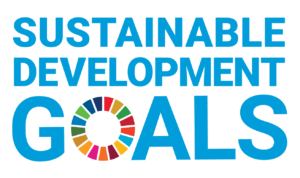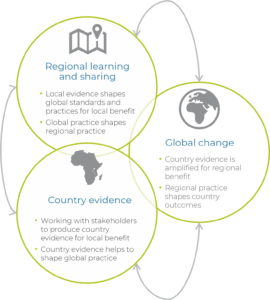How Cenfri makes change happen
How Cenfri makes change happen
12 October, 2021 •Here at Cenfri, impact guides everything we do. As an economic impact agency, we aim to solve problems to build digital and financial inclusion in order to help people and economies thrive. We work with development partners, governments, academics, think-tanks and industry to generate market and consumer outcomes, implement donor programmes and provide advice to the private sector and regulators.
 Ultimately, we want to support the attainment of the Sustainable Development Goals (SDGs) – to help to build a world of opportunity and greater equality, where people and societies thrive, and where the environment is protected. A big question for us and our partners is how we respond and contribute to these broad goals in the work we do, and how we set out on the best pathway to deliver meaningful impact.
Ultimately, we want to support the attainment of the Sustainable Development Goals (SDGs) – to help to build a world of opportunity and greater equality, where people and societies thrive, and where the environment is protected. A big question for us and our partners is how we respond and contribute to these broad goals in the work we do, and how we set out on the best pathway to deliver meaningful impact.
In this note, we set out what impact we work towards, guided by the SDGs as our ultimate North Star, and how we make this change happen in a powerful local-global-local change cycle through which we work to empower others to solve problems that matter for ultimate impact. We also highlight how we’ve leveraged this cycle in some of our recent work and what we’ve achieved as a result.
Our change process is anchored in a local-global-local impact cycle:
- We bring together a consortium of partners around a common impact objective and work with them to identify the intractable problems that need to be addressed.
- We generate robust evidence around such problems through a local or country process. As part of this process, we share fit-for-context consumer and market insights with key stakeholders in the private and public sectors and then work to empower them to apply these insights. We do this through facilitating workshops, training and technical assistance around these insights.
- We take this evidence and insights into regional and global processes to help shape global solutions and guidance around these problems.
We then take these global solutions back down to implement through local or country processes.
Through all these activities we build relationships and leverage these to increase the collaboration of market actors across the local and global ecosystems. This approach allows us to empower others as change agents, working towards the ultimate changes that we all want to see.
Step by step, this iterative sequence of change events builds towards influencing policy and business strategy as well as improving the overall market system in which these strategies are implemented. Ultimately, these improvements and changes begin to reflect in the real economy.
Our inclusive insurance work illustrates how we’ve used the impact cycle to achieve both global and local success:
Starting local to build up insights
We worked with A2ii and other partners (such as the ILO, FSD Africa and FinMark Trust) to conduct inclusive insurance and insurance market development country diagnostics in several countries at the local level. In each instance, the diagnostics entailed extensive in-country consultations and desktop research that followed a market systems approach. Given the interplay between the stage of market development and the economic environment, each study took stock of the contextual drivers of market development, as well as the policy, legislative and regulatory frameworks that set the parameters for market participation.
On this basis, we identified key market development imperatives, made and shared recommendations with the local stakeholders to help unlock inclusive insurance, as well as, highlighting the potential role of insurance in sustainable and inclusive growth.
For the inclusive insurance diagnostics, we then produced action plans and facilitated the forming of local steering committees to implement our recommendations.
These action plans included regulatory guidance and regulation development, as well as innovation workshops with stakeholders across the sector and partnership brokering between insurers and client aggregators as distribution partners.
So, our approach involved informing local change agents in both the market and regulatory spheres and facilitating their collaboration in order to catalyse change at a country level.
Taking our insights global and back again to the country level
We were central to adding up the learning across the A2ii inclusive insurance and insurance market development diagnostics into cross-country synthesis reports.
We then worked to incorporate the findings and recommendations into the global insurance standard-setting body, the IAIS, through representing the A2ii in inputting into IAIS inclusive insurance guidance, including an issues paper, inclusive insurance application guidance and thematic papers dealing with conduct of business and digital technology in inclusive insurance.
As IAIS guidance creates a mandate for country-level application, this work had a powerful effect on filtering back down to the local level and shaping local regulatory and supervisory practices.
We also took the A2ii diagnostics findings and IAIS recommendations to a regional level by engaging the SADC non-bank financial institution committee (CISNA) in developing a framework for microinsurance approach harmonisation across the SADC region.
Furthermore, we engaged in building national-level capacity through engagements at the regional and at the global level.
Among others, we developed a regulating-for-innovation module for the annual A2ii and Toronto Centre training curriculum for insurance regulators, inputted to global regulatory training on insurtech by CCAF, and developed a regulating-for-innovation toolkit that we are helping supervisors to implement at country level.
We continue to work with the A2ii and country regulators to update and translate global guidance into regional and local implementation.





